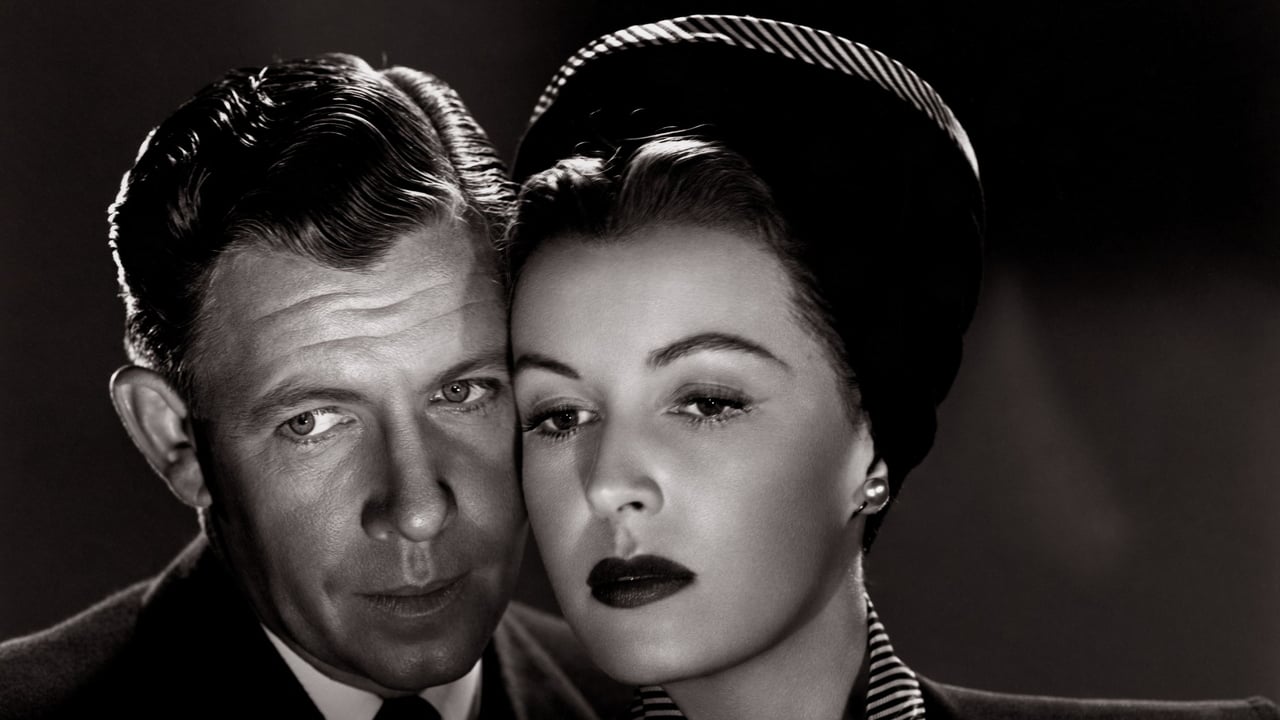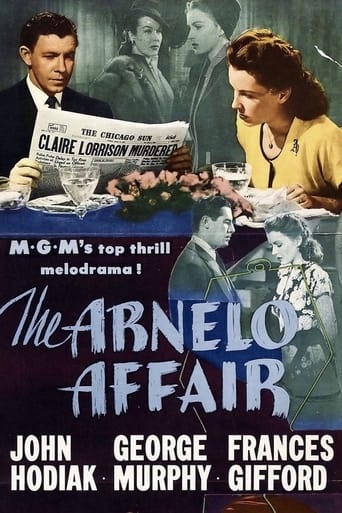Inclubabu
Plot so thin, it passes unnoticed.
Dirtylogy
It's funny, it's tense, it features two great performances from two actors and the director expertly creates a web of odd tension where you actually don't know what is happening for the majority of the run time.
Hadrina
The movie's neither hopeful in contrived ways, nor hopeless in different contrived ways. Somehow it manages to be wonderful
Billy Ollie
Through painfully honest and emotional moments, the movie becomes irresistibly relatable
RanchoTuVu
The story of a woman (Frances Gifford) whose marriage to a successful attorney (George Murphy) leaves her feeling under-appreciated. When she catches the eye of a client who owns an upscale night club (John Hodiak) and, as a means of getting to know her on more intimate terms, offers her a job to redo the interior decorating on his apartment, she eventually accepts, seemingly knowing what this would lead to. Married with a cute son (Dean Stockwell), she realizes she has everything to lose in the Arnelo Affair, especially when Tony Arnelo turns out to be a womanizer who is not above knocking off an interfering ex-lover, the evidence of which points to Gifford, thus adding considerably to her already heightened sense of anxiety, which seems to put her in a state of semi-shock. The affair goes on within her social circle which is captured in a great scene in Arnelo's night club after the murder, with Eve Arden, who is Gifford's friend, noticing something going on between Arnelo and Gifford. Murphy is pretty good as Gifford's husband who realizes she went astray due to his lack of attention. Gifford is worth seeing for her part as she gives in to her desire for Arnelo all the while racked with doubt and guilt and then fear of losing everything dear to her over doing so. And Hodiak turns in a great role as Arnelo, with exceeding smoothness and subtlety.
Benoît A. Racine (benoit-3)
This is not the worst film ever made. Just one the most confused crime stories ever to reach a movie screen before the advent of Quentin Tarantino. A lovely "ordinary" housewife (Frances Gifford) - who also dresses like Greta Garbo's understudy - finds herself fatally attracted to a fiery-eyed Italian greaseball (John Hodiak) who owns a nightclub. Melodrama ensues... Her husband is a nice, reliable, hunk of manhood, that any woman (of that time) would have given her eyeteeth to bed (George Murphy). Her adorably precocious, pretty and curly-haired nine year old son who has recurring nightmares about chocolate (!) and whose psychological problems provide comic relief (!!) is played by Dean Stockwell. She has a devoted Black maid and her best spinster friend is an amusing wisecracking clotheshorse in eye-popping outfits (played by Eve Arden) who can sniff out "man trouble" a mile away.So what's wrong with this picture? Everything. The styles are confused. It's basically a Harlequin-type women's novel (also known as women's porn) that would like to pretend it's also a murder mystery film noir and witty enough to be an Oscar Wilde adaptation by Joseph L. Mankiewicz - with just a touch of "Madame Bovary" thrown in at the last minute for good measure. But the literary pretensions are not what sinks this turkey. Many other elements contribute to the downfall. The fact that the morality of the times transpires at every turn, for instance... The heroine is not guilty of adultery, just of having flirted with the idea of having a life, a career and aspirations to happiness of her own, outside the domination of her boring, all-knowing husband and the prevalent "feminine mystique" which defines her persona, while also lusting for the exoticism of a fling with pencil-mustachioed impudent male Latino flesh. The powder compact she leaves behind at the scene of the crime actually shows more signs of life and expression than she ever does. The Tony Arnelo character is really guilty of being a dirty no-good wop from the wrong side of the tracks in spite of his stated (uppity) obsession for beauty and his highly suspicious fixation on his mother. You have to ask: Is this why he is attracted to this woman? And what about the Dean Stockwell character's equally ambiguous attraction to his own mother? Ms. Gifford treats her Black housemaid worse than any Southern belle would a plantation slave. The couple's friends (as revealed in the nightclub conversation) are all shallow, blasé, effete, snobbish and decadent, which was considered the mark of true intellect (a.k.a. homosexuality and/or communism) in Hollywood circles in those days. Their idea of small talk is simply hair-raising. The gangster's girlfriend is an actress (i.e. another transgressive working female, a.k.a. a whore, which is the only alternative to being a "mother" and a "dried-up old maid" in this universe) who deserves to die and whose only excuse for living is making trouble for everybody else. All non-procreative females are, after all, expandable. The Central Casting police detective chews gum continuously and is thrown leftover lines from every Bogart picture ever made. This is also the film that put a definitive end to Eve Arden's career as a serious character actress playing funny women and turned her into a prop and the role model for drag queens everywhere, i.e. a frustrated old maid milliner whose financial independence allows her to indulge in extravagant dress, barely controlled nymphomania, tough-girl mannerisms bordering on lesbianism and unfunny deadpan cracks that simply overstay their welcome for lack of substance and meaning, double, single or otherwise.The men walk like they are afraid to dent or crease the architecturally daunting square-shouldered suits they are expected to macho-posture in and the women are made breathless and dizzy from the repression three-way girdles exercise on their vital organs and cute hats on their brains. The film is without tension and unfurls at a morbid and soporific pace. By the time the Frances Gifford character turns off that horrifically elaborate chrome and lucite monstrosity of a lamp at her bedside, you really wish to God the sleeping pills will take effect and this nightmare will end, even though she has sleep-walked in a near-comatose state all through the film.
blanche-2
Frances Gifford gets mixed up in "The Arnelo Affair," a 1947 film also starring George Murphy, John Hodiak, Eve Arden and Dean Stockwell. In fact, the film was on TCM as part of Dean Stockwell's birthday. He certainly was an adorable little boy.Gifford plays Anne Parkson, the neglected wife of a successful attorney, Ted Parkson (Murphy). One night, Ted brings home a shady client, Tony Arnelo (Hodiak), who owns a nightclub. Arnelo has an immediate attraction to Anne and, upon learning that she has dabbled in room design, he invites her to decorate his club. Of course, he couldn't care less if his club ever gets decorated or not. Though Anne hasn't yet said "yes," he gives her a key to his place after their first meeting and invites her back the next day at 2. She arrives the next day and is confronted by an actress-girlfriend of Tony's. Tony slaps the woman and the frightened Anne runs away, the compact that her husband gave her falling out of her purse. The next day, she sees in the paper that the woman has been killed. In exchange for the compact and a letter he later steals, Tony wants Anne.This is a good-looking film, with beautifully tailored mens suits on Hodiak and Murphy and smashing clothes for Gifford and Eve Arden, who owns her own dress shop. And that's about it. The dialogue is totally predictable - when Anne asks her husband to go away with her, the words were out of my mouth 30 seconds before she said the line. The attractive Gifford is a bore and gives no shading to her role at all. MGM never could figure out what to do with Laraine Day - why didn't she make this? Murphy has a pleasant way about him and Hodiak is okay, but frankly, Dean Stockwell as Anne's son steals that show. That's not saying much. Eve Arden is good but wasted.The music is overpowering, and the pacing is slow. "The Arnelo Affair" needed a strong actress in the lead, better dialogue and faster pacing. Without those elements, it's pretty dull.
David (Handlinghandel)
This movie is unsuccessful as a noir, a crime drama -- as anything, really.John Hodiak is always compelling, though he isn't a convincing villain here. George Murphy is barely adequate.Frances Gifford -- whose bio I just read here, and who had a tragic life -- is very beautiful but directed to act as if in a coma.Even Eve Arden's quips fall uneasily flat in this context.The best performance is given by Dean Stockwell, as the strangely troubled child Murphy and Gifford profess to adore but who seems to be ignored by his father and to have an extreme affection for his mother.

